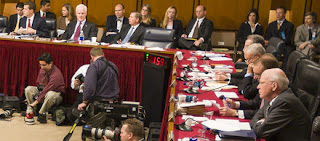On March 21, 2017, President Donald Trump's Supreme Court nominee, Judge Neil M. Goruch of the United States Court of Appeals for the Tenth Circuit, began his second day of testimony before the Senate Judiciary Committee. On the second day of testimony, the members of the Judiciary Committee questioned Judge Gorsuch directly. I look forward to providing analysis of Judge Gorsuch's testimony once it is completed.
For now, I would like to quote a passage from Judge Gorsuch's testimony that he delivered in response to questions from Dianne Feinstein of California regarding his position on Chevron deference. Judge Gorsuch determined that Senator Feinstein was likely referring to his decision in Gutierrez-Brizuela v. Lynch, 834 F.3d 1142 (10th Cir. 2016) [PDF version], in her questioning. Judge Gorsuch said the following about his decision in that case:
“It involved an undocumented immigrant to this country. And the question was, there were two conflicting statutes. One said, he could apply for immediate discretionary relief in this country from the Attorney General. [The] second said, he had to wait outside the country for ten years. We had a judicial precedent that said the first statute controls. That was the ruling of our court. After that, three or four years, I can't remember exactly, the Board of Immigration Appeals [in] its infinite wisdom says our interpretation is wrong, [because of] Chevron, you have to undo your precedent, the judicial precedent, that this man had relied upon and that he now had to wait outside the country not just ten years, but 13 or 14 because it took him so long to make up [his] mind.
Senator, that reminded me of when Charlie Brown is going in to kick the ball, and Lucy picks it up at the last second, and that struck me as raising serious due process concerns, fair notice, and separation of powers concerns. When an Executive bureaucracy can overturn a judicial precedent without an act of Congress[,] that's what the case is about. And it suggested respectfully than under the APA, the Administrative Procedures Act that this body tasked judges to decide legal questions and left to administ[rative] agencies great deference when it comes to fact finding … The only question is who decides what the law is? Can a man like Mr. Gutierrez, the least among us, be able to rely on judicial preceden[t] on the books, can he have the ball picked up as he [is] going in for the kick?”
See transcript [link]. Please note that the transcript was compiled by C-Span from uncorrected Closed Captioning. I made mild modifications for readability and to accurately what Judge Gorsuch actually said.
Although Judge Gorsuch did not go into detail regarding his views on Chevron, or any other issue that may come before the Court, it was interesting to see him discuss two of his most important decisions relating to immigration law and administrative law in general. We covered Judge Gorsuch's decisions in Gutierrez-Brizuela [see article] and in the first case to which he referred in his testimony, De Niz Robles v. Lynch, 803 F.3d 1165 (10th Cir. 2015) [see article]. For additional insight into Judge Gorsuch's writing on immigration law, please see our article on his unrelated decision in Montano-Vega v. Holder, 721 F.3d 1165 (10th Cir. 2013) [see article]. Finally, please see my comprehensive profile on Judge Gorsuch's background and record [see blog].
Please visit the nyc immigration lawyers website for further information. The Law Offices of Grinberg & Segal, PLLC focuses vast segment of its practice on immigration law. This steadfast dedication has resulted in thousands of immigrants throughout the United States.
Lawyer website: http://myattorneyusa.com

No comments:
Post a Comment